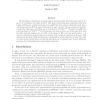Free Online Productivity Tools
i2Speak
i2Symbol
i2OCR
iTex2Img
iWeb2Print
iWeb2Shot
i2Type
iPdf2Split
iPdf2Merge
i2Bopomofo
i2Arabic
i2Style
i2Image
i2PDF
iLatex2Rtf
Sci2ools
133
click to vote
STOC
2005
ACM
2005
ACM
Pseudorandom generators for low degree polynomials
We investigate constructions of pseudorandom generators that fool polynomial tests of degree d in m variables over finite fields F. Our main construction gives a generator with seed length O(d4 log m(1 + log(d/ )/ log log m) + log |F|) bits that achieves arbitrarily small bias and works whenever |F| is at least polynomial in d, log m, and 1/ . We also present an alternate construction that uses a seed that can be described by O(c2 d8 m6/(c-2) log(d/ ) + log |F|) bits (more precisely, O(c2 d8 m6/(c-2) ) field elements, each chosen from a set of size poly(cd/ ), plus two field elements ranging over all of F), works whenever |F| is at least polynomial in c, d, and 1/ , and has the property that every element of the output is a function of at most c field elements in the input. Both generators are computable by small arithmetic circuits. The main tool used in the construction is a reduction that allows us to transform any "dense" hitting set generator for polynomials into a pseu...
Related Content
| Added | 03 Dec 2009 |
| Updated | 03 Dec 2009 |
| Type | Conference |
| Year | 2005 |
| Where | STOC |
| Authors | Andrej Bogdanov |
Comments (0)

